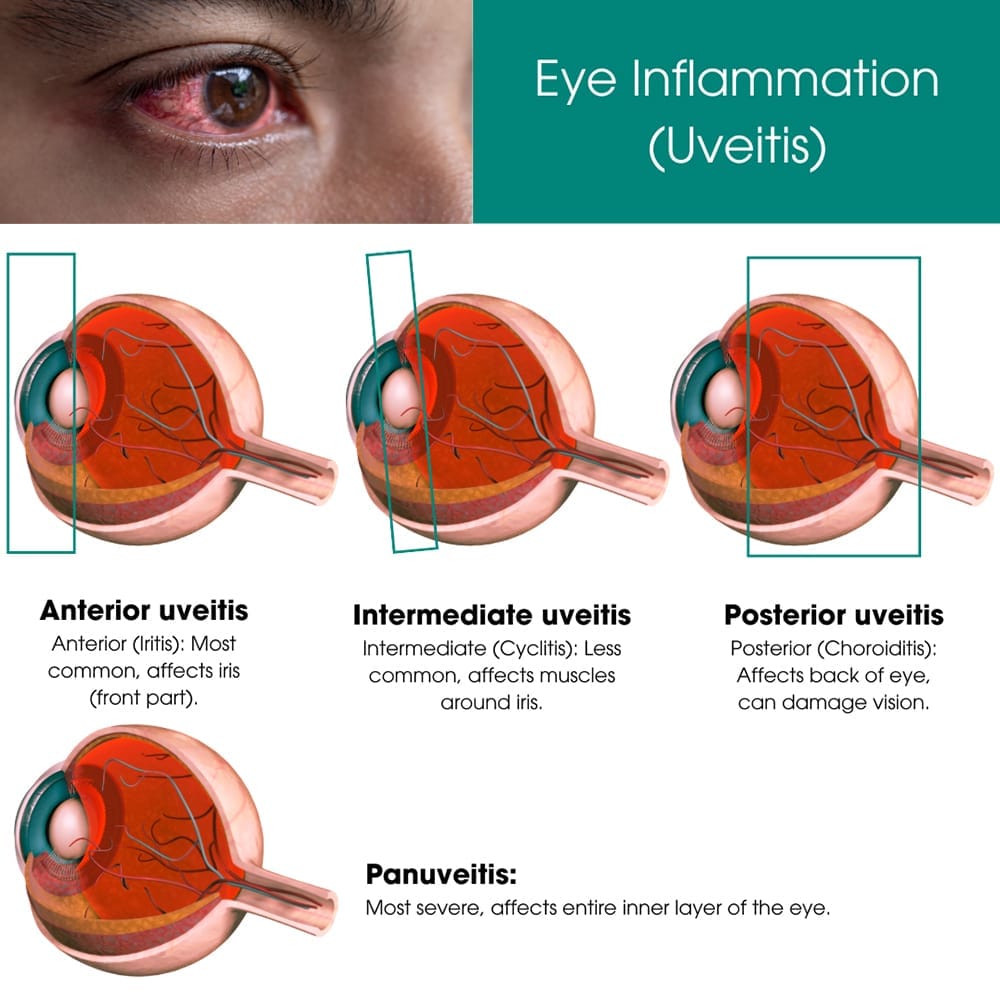Uveitis is an inflammation of the uvea, which is the central layer of the eye that contains the iris, ciliary body and choroids in the middle part of your eyes. Warning signs of uveitis often appear unexpectedly and worsen quickly. The condition can affect people of all ages, including children. It might be acute, lasting only a few weeks, or chronic, lasting months or even years. It can have terrible effects, including irreversible loss of sight.
This eye inflammation can be categorized into different types based on the part of the uvea that’s affected:

The duration of the swelling depends on the underlying cause. Uveitis isn’t contagious and the prognosis depends on several factors, including how quickly it’s detected and treated by a uveitis specialist. With early and appropriate treatment, the prognosis is favorable, and you can recover without severe long-term consequences. Early detection and proper treatment depend on your eye doctor as only a trained optometrist can provide you with a correct diagnosis, quick intervention and safe eye inflammation treatment.
If you’re looking for a uveitis specialist in Manhattan, your search is over. The Eye Physicians in NYC have skilled doctors with the experience and talent to prevent issues, preserve your vision and deliver comprehensive eye care for you and your family.
In addition to eye inflammation treatment for panuveitis, they provide a wide range of services to treat several conditions, including:
Wonderful experience…I was really worried about the eye tests..every step was explained and equipment clean .. from the receptionist to the doctor… a nice experience.
ReviewsNot only a great doctor but an excellent teacher. I like understanding my own medical care and the diagnostic procedures.
ReviewsDr. Cooney was funny, kind snd very adept in his expertise of eyes! I would recommend him!
ReviewsSymptoms can build gradually, and they may affect one or both eyes. On rare occasions, you won’t even have any symptoms at all, which is why it’s so important to have regular eye exams, when your uveitis specialist discovers the abnormality before you have any discomfort. When you do have symptoms, however.
They may include:
Uveitis is most common in adults aged 20 to 60, and smoking increases your chances of getting it.
Without proper uveitis treatment, it can also cause more severe and complicated symptoms that could include:
Uveitis can be caused by tumors that affect the eyes, such as lymphomas. However, sometimes the causes of uveitis are a bit of a mystery.
But the effectiveness of uveitis treatment in NYC depends on identifying the underlying cause, which may include:
Uveitis can be detected during an eye doctor’s simple and painless dilated eye examination. After widening your pupil with special eye medications, the doctor inspects your eyes for symptoms of uveitis and other potential eye problems. It’s a simple practice to keep your eyes in excellent condition and catch the early signs of conditions like uveitis.
When uveitis is caused by a medical condition, treatment is targeted to that particular disease. If the cause is infectious, treatment for eye inflammation consists of antibiotics, possible antibiotic eyedrops and careful monitoring.
Treatment might last months or years and includes different approaches such as:
Vitrectomy, a surgical technique that removes some of the vitreous in your eye, is occasionally recommended but rarely used. For difficult posterior uveitis, an eye-implanted device provides continuous corticosteroid release for months or years.
Other additional measures may include:
The type of uveitis and the severity of the symptoms determines how quickly you recover. Severe inflammation takes longer to resolve than lesser cases, and uveitis may reoccur. To set up a standard screening or to visit the best-rated ophthalmologist in Downtown Manhattan, contact Eye Physicians for an appointment, especially if you already have symptoms.
Additionally, the experts at Eye Physician in New York City provide comprehensive eye exams, pediatric eye exams, and other treatments, including:
Eye Physicians
110 Lafayette St, Suite 503
New York, NY 10013
(212) 292-4814
Entrust the care of your precious eyesight to highly skilled and experienced eye care professionals. For top-notch ophthalmologists and optometrists in Downtown Manhattan, choose Eye Physicians. Eye Physicians ensures prompt care, precise diagnosis, and personalized treatment plans.
Schedule an Appointment